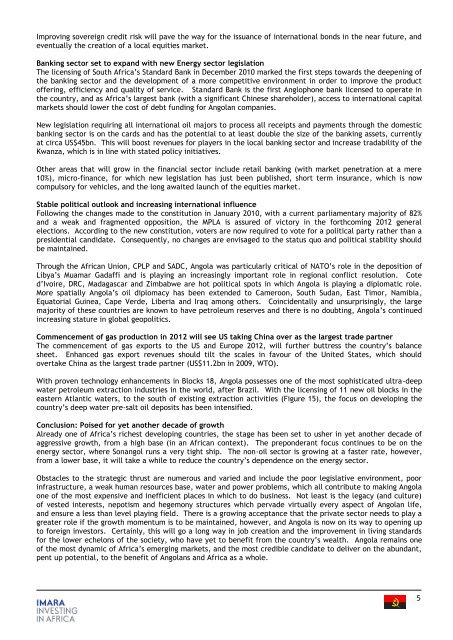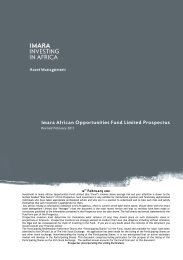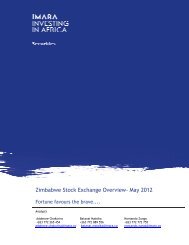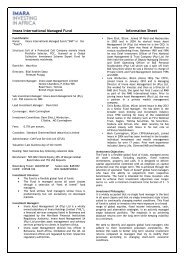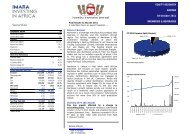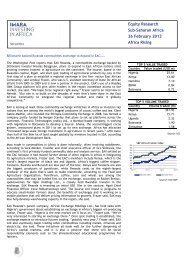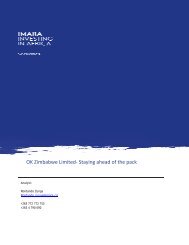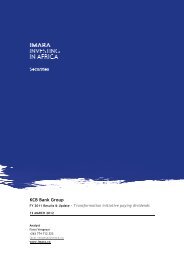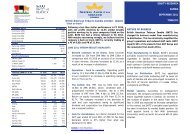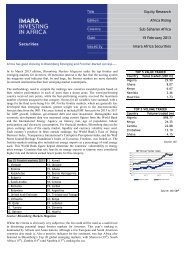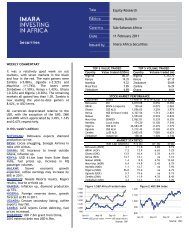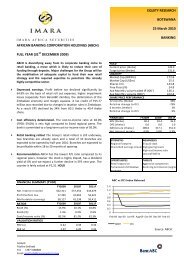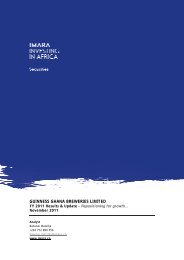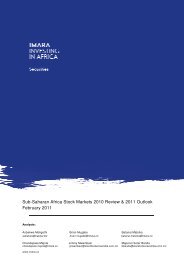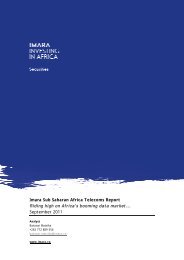Imara African Cement Report Africa, the last cement frontier Angola ...
Imara African Cement Report Africa, the last cement frontier Angola ...
Imara African Cement Report Africa, the last cement frontier Angola ...
You also want an ePaper? Increase the reach of your titles
YUMPU automatically turns print PDFs into web optimized ePapers that Google loves.
Improving sovereign credit risk will pave <strong>the</strong> way for <strong>the</strong> issuance of international bonds in <strong>the</strong> near future, and<br />
eventually <strong>the</strong> creation of a local equities market.<br />
Banking sector set to expand with new Energy sector legislation<br />
The licensing of South <strong>Africa</strong>‟s Standard Bank in December 2010 marked <strong>the</strong> first steps towards <strong>the</strong> deepening of<br />
<strong>the</strong> banking sector and <strong>the</strong> development of a more competitive environment in order to improve <strong>the</strong> product<br />
offering, efficiency and quality of service. Standard Bank is <strong>the</strong> first Anglophone bank licensed to operate in<br />
<strong>the</strong> country, and as <strong>Africa</strong>‟s largest bank (with a significant Chinese shareholder), access to international capital<br />
markets should lower <strong>the</strong> cost of debt funding for <strong>Angola</strong>n companies.<br />
New legislation requiring all international oil majors to process all receipts and payments through <strong>the</strong> domestic<br />
banking sector is on <strong>the</strong> cards and has <strong>the</strong> potential to at least double <strong>the</strong> size of <strong>the</strong> banking assets, currently<br />
at circa US$45bn. This will boost revenues for players in <strong>the</strong> local banking sector and increase tradability of <strong>the</strong><br />
Kwanza, which is in line with stated policy initiatives.<br />
O<strong>the</strong>r areas that will grow in <strong>the</strong> financial sector include retail banking (with market penetration at a mere<br />
10%), micro-finance, for which new legislation has just been published, short term insurance, which is now<br />
compulsory for vehicles, and <strong>the</strong> long awaited launch of <strong>the</strong> equities market.<br />
Stable political outlook and increasing international influence<br />
Following <strong>the</strong> changes made to <strong>the</strong> constitution in January 2010, with a current parliamentary majority of 82%<br />
and a weak and fragmented opposition, <strong>the</strong> MPLA is assured of victory in <strong>the</strong> forthcoming 2012 general<br />
elections. According to <strong>the</strong> new constitution, voters are now required to vote for a political party ra<strong>the</strong>r than a<br />
presidential candidate. Consequently, no changes are envisaged to <strong>the</strong> status quo and political stability should<br />
be maintained.<br />
Through <strong>the</strong> <strong><strong>Africa</strong>n</strong> Union, CPLP and SADC, <strong>Angola</strong> was particularly critical of NATO‟s role in <strong>the</strong> deposition of<br />
Libya‟s Muamar Gadaffi and is playing an increasingly important role in regional conflict resolution. Cote<br />
d‟Ivoire, DRC, Madagascar and Zimbabwe are hot political spots in which <strong>Angola</strong> is playing a diplomatic role.<br />
More spatially <strong>Angola</strong>‟s oil diplomacy has been extended to Cameroon, South Sudan, East Timor, Namibia,<br />
Equatorial Guinea, Cape Verde, Liberia and Iraq among o<strong>the</strong>rs. Coincidentally and unsurprisingly, <strong>the</strong> large<br />
majority of <strong>the</strong>se countries are known to have petroleum reserves and <strong>the</strong>re is no doubting, <strong>Angola</strong>‟s continued<br />
increasing stature in global geopolitics.<br />
Commen<strong>cement</strong> of gas production in 2012 will see US taking China over as <strong>the</strong> largest trade partner<br />
The commen<strong>cement</strong> of gas exports to <strong>the</strong> US and Europe 2012, will fur<strong>the</strong>r buttress <strong>the</strong> country‟s balance<br />
sheet. Enhanced gas export revenues should tilt <strong>the</strong> scales in favour of <strong>the</strong> United States, which should<br />
overtake China as <strong>the</strong> largest trade partner (US$11.2bn in 2009, WTO).<br />
With proven technology enhan<strong>cement</strong>s in Blocks 18, <strong>Angola</strong> possesses one of <strong>the</strong> most sophisticated ultra-deep<br />
water petroleum extraction industries in <strong>the</strong> world, after Brazil. With <strong>the</strong> licensing of 11 new oil blocks in <strong>the</strong><br />
eastern Atlantic waters, to <strong>the</strong> south of existing extraction activities (Figure 15), <strong>the</strong> focus on developing <strong>the</strong><br />
country‟s deep water pre-salt oil deposits has been intensified.<br />
Conclusion: Poised for yet ano<strong>the</strong>r decade of growth<br />
Already one of <strong>Africa</strong>‟s richest developing countries, <strong>the</strong> stage has been set to usher in yet ano<strong>the</strong>r decade of<br />
aggressive growth, from a high base (in an <strong><strong>Africa</strong>n</strong> context). The preponderant focus continues to be on <strong>the</strong><br />
energy sector, where Sonangol runs a very tight ship. The non-oil sector is growing at a faster rate, however,<br />
from a lower base, it will take a while to reduce <strong>the</strong> country‟s dependence on <strong>the</strong> energy sector.<br />
Obstacles to <strong>the</strong> strategic thrust are numerous and varied and include <strong>the</strong> poor legislative environment, poor<br />
infrastructure, a weak human resources base, water and power problems, which all contribute to making <strong>Angola</strong><br />
one of <strong>the</strong> most expensive and inefficient places in which to do business. Not least is <strong>the</strong> legacy (and culture)<br />
of vested interests, nepotism and hegemony structures which pervade virtually every aspect of <strong>Angola</strong>n life,<br />
and ensure a less than level playing field. There is a growing acceptance that <strong>the</strong> private sector needs to play a<br />
greater role if <strong>the</strong> growth momentum is to be maintained, however, and <strong>Angola</strong> is now on its way to opening up<br />
to foreign investors. Certainly, this will go a long way in job creation and <strong>the</strong> improvement in living standards<br />
for <strong>the</strong> lower echelons of <strong>the</strong> society, who have yet to benefit from <strong>the</strong> country‟s wealth. <strong>Angola</strong> remains one<br />
of <strong>the</strong> most dynamic of <strong>Africa</strong>‟s emerging markets, and <strong>the</strong> most credible candidate to deliver on <strong>the</strong> abundant,<br />
pent up potential, to <strong>the</strong> benefit of <strong>Angola</strong>ns and <strong>Africa</strong> as a whole.<br />
5


